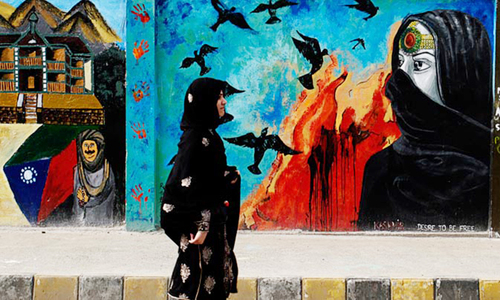Pakistan has shown a dismal performance when it comes to gender parity, according to the 'Global Gender Gap Report 2021' published by the World Economic Forum on Wednesday, slipping two spots since last year to rank 153rd out of 156 countries on the index.
The report found that Pakistan's gender gap had widened by 0.7 percentage points, to 55.6 per cent, making it one of the worst countries for gender parity. Only Iraq, Yemen and Afghanistan fared worse.
The scorecard for the country places Pakistan at 152 in economic participation and opportunity, 144 in educational attainment, 153 in health and survival, and 98 in political empowerment.
In the South Asian region, Pakistan ranked seventh among eight countries, Afghanistan being the lowest. In its overall observation, the report commented that "progress has stagnated", observing that the estimated time to close the gender gap has now increased to 136.5 years.
It also pointed out that the Covid-19 pandemic may have widened the existing disparities.

Pakistan featured among the bottom 10 countries in two of the four sub-indexes — economic participation and opportunity and health and survival — according to the report.
The country closed just 31.6pc of its gender gap in economic participation and opportunity.
Worsening with time
Pakistan's rankings have worsened over time, with data collected showing that in 2006, the country ranked 112 in economic participation and opportunity, 110 in education attainment, 112 in health and survival, and 37 in political empowerment.
"Few women participate in the labour force (22.6pc) and even fewer are in managerial positions (4.9pc). This means that only 26.7pc and 5.2pc, respectively, of these gaps have been closed so far, translating into very large income disparities between women and men: on average, a Pakistani woman's income is 16.3pc of a man's," the report stated.
However, improvement has been seen with more women taking on professional and technical roles — 25.3pc, up from 23.4pc in the previous edition of the index.
It pointed out that women do not have equal access to justice, ownership of land, and non-financial assets or inheritance rights.
When it comes to education, gender gaps as large as 13pc or more exist across all levels. According to the report, "these gaps are the widest at lower education levels (84.1pc primary enrolment gap closed) and are somewhat narrower for higher education levels (84.7pc gap closed in secondary enrolment and 87.1pc closed in tertiary enrolment).
"Further, only 46.5pc of women are literate, 61.6pc attend primary school, 34.2pc attend high school and 8.3pc are enrolled in tertiary education courses."
Pakistan has closed 94.4pc of its health and survival gender gap, the report stated, adding that the gap on this sub-index was negatively impacted by wide sex ratio at birth (92pc) due to gender-based sex-selective practices. Around 85pc of women have suffered intimate partner violence, it further said.
Pakistan's rank is relatively higher for political empowerment, the report said, observing however that only 15.4pc of this gap has been closed to date. "With just 4.7 years (in the last 50) with a woman as head of state, Pakistan is one of the top 33 countries in the world on this indicator. However, women's representation among parliamentarians (20.2pc) and ministers (10.7pc) remains low."
Regional performance
The South Asian region is the second-lowest performer on the index, after Middle East and North Africa, with 62.3pc of its overall gender gap closed. Progress has been too slow in the recent past, and this year has actually reversed, the report said.
"Within the region, a wide gulf separates the best-performing country, Bangladesh, which has closed 71.9pc of its gender gap so far, from Afghanistan, which has only closed 44.4pc of its gap. India is the third-worst performer in the region, having closed 62.5pc of its gap.
"Only Bhutan and Nepal have demonstrated small but positive progress towards gender parity this year, while all other countries in this region have registered either slightly reduced or stagnant performances," the report stated.














































